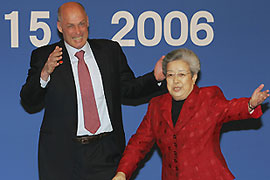US presses China on yuan
Trade talks end with agreement to narrow differences but no timetable on policies.

“The United States and China know that our economic relationship is best when it produces benefits for both our countries. And we know that balanced sustainable growth in China is vital to the strength of the global economy,” Paulson said.
“We will each take measures to address global imbalances, notably through greater national savings in the United States and through increased domestic consumption and exchange rate flexibility in China, and maintaining open investment in both countries.”
Differences
|
“That such differences remain is understandable because the actual situations of China and the United States are completely different” |
Wu Yi, the Chinese vice-premier, said the talks would help to boost bilateral trade and economic relations.
She said the two sides had not seen eye-to-eye on every issue, but said that was understandable given the economic differences between China and America.
“This dialogue has helped both of us to build mutual understanding and enhance trust,” she said.
“That such differences remain is understandable because the actual situations of China and the United States are completely different.”
The two governments also pledged to explore how to boost bilateral investment, ease travel restrictions and co-operate more closely to protect the environment and develop cleaner energy sources.
They will also form working groups to discuss how to boost trade in services and improve healthcare. The groups will report to the second session of the dialogue in Washington in May.
Pressure
 |
| The two sides exchanged positive words but laid out no timetable [Picture: GALLO/GETTY] |
The agreements come as US legislators stepped up pressure for China to boost the value of its currency, expressing impatience at the idea of waiting for Beijing to let the yuan’s exchange rate float in the long term.
But China is not ready to be a punching bag.
A day after Wu questioned America’s “limited knowledge” of China’s efforts to give market forces greater sway over the economy, the People’s Daily, the official paper of the ruling Communist Party, said the US had China to thank for a long period of low inflation.
“Without trade with China, since the 1990s the United States would never have experienced a long-term absence of inflationary growth unprecedented in its history,” it said.
Speaking during the final day of talks on Friday, Ben Bernanke, the US Federal Reserve chairman, said that if China made its currency more flexible, it would improve its people’s standard of the living and foster economic stability around the world.
Bernanke said it was in China’s best interest to let the yuan rise in value against the dollar.
China freed the yuan from a dollar peg in July 2005, and it has since gained 3.74 per cent.
On Friday, the central bank set the currency’s mid-point at a new post-reform high, 7.8185 to the dollar, for the second day in a row.